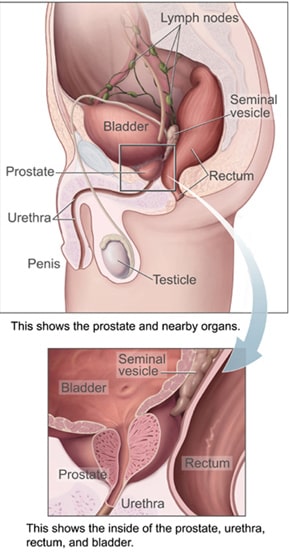Learn More
Let’s face it. Most men hate going to the doctor. They cringe, especially when the doctor says bend over, this might be a little “uncomfortable.” The infamous digital rectal exam or DRE many times is required to check your prostate for cancer. However, another test that is not necessarily a replacement for a DRE, is the prostate specific antigen blood test or PSA. The PSA blood test is sent out to a lab for analysis and your PSA number is established. Depending on your age and family history, that number will help your doctor determine if further testing is required.

American Society of Clinical Oncology, Inc.
Prostate cancer cases on the rise
Prostate Basics
The prostate is a walnut-sized gland that is situated below the bladder, in front of the rectum, and behind the penis. The urethra, a tube-like canal that transports urine and sperm via the penis, is encircled by the prostate.
The primary job of the prostate is to produce seminal fluid, the liquid found in semen that nourishes, shields, and aids in the movement of sperm. As men age, the prostate continues to grow larger. The urethra can get blocked by the enlarged prostate; this can result in the condition known as benign prostatic hypertrophy (BPH).
BPH is a common condition linked to aging and has not been linked to an increased risk of developing prostate cancer. Men should always get annual prostate exams.
Prostate Cancer Development
Prostate cancer begins when healthy cells in the prostate gland start to change and expand uncontrollably into a mass known as a tumor. If a tumor is malignant (cancerous) it has the potential to spread to other parts of the body. A benign tumor won’t grow and spread.
Early detection is necessary to stop the cancer from spreading. All men over 40 years of age should see their doctor annually to have a PSA test and/or a DRE.
Screening for Prostate Cancer | United Urology
Regular testing for prostate cancer has been proven to aid in early detection. And the earlier prostate cancer is detected, the better chances for successful treatment and long-term survival.
Prostate Cancer | United Urology
Prostate cancer is the second most common type of cancer among American men and 10% of men develop the disease at some point in their lifetime, most after the age of 50.
